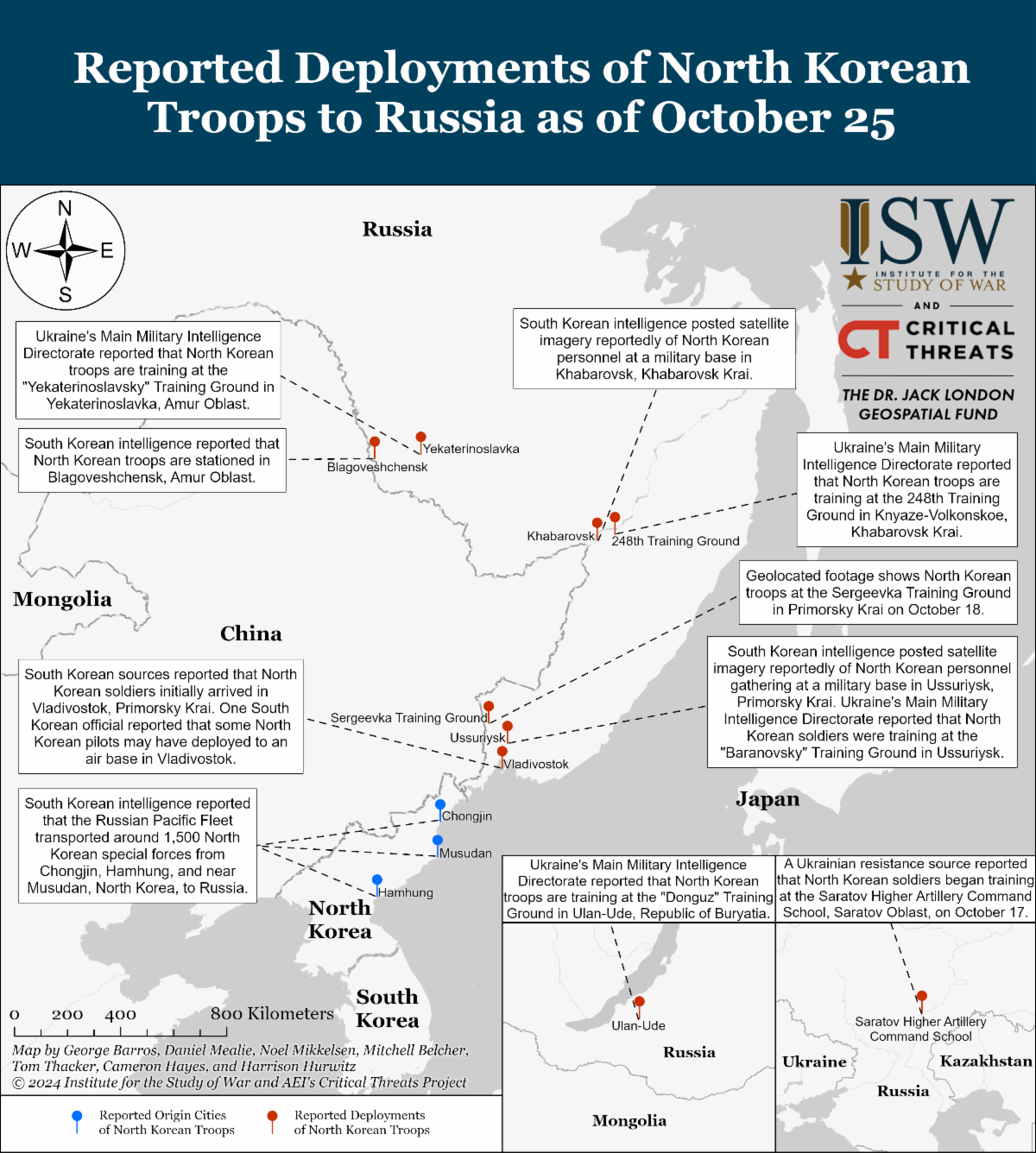```html
주요 요점:
- 러시아와 북한 간의 장기적 동맹의 의미는 우크라이나 전장을 훨씬 넘어 한국반도와 아시아 태평양 지역의 안정에 장기적인 영향을 미칠 수 있다.
- 우크라이나 전쟁은 모든 미래 전쟁의 성격을 바꿀 것이며, 평양은 이 사실을 군대에 대한 중요한 학습 기회로 분명히 파악하고 있다. 북한군은 1953년 이후 대규모 재래식 전투를 경험하지 않았으며, 특히 한국과 같은 정교한 적에 맞서 현대전에서 싸울 준비가 되어 있지 않다는 것을 알고 있다.
- 북한은 군대가 공격 교리를 개선하고, 서방이 제공한 적에 맞서 무기 시스템을 시험하고, 지휘 통제 경험을 얻고, 현대 전장에서 드론과 전자전(EW) 시스템을 운영하는 방법을 배울 기회를 가질 수 있기를 바랄 것이다. 평양은 우크라이나 전쟁에서 군대가 배운 기술이 한국반도를 포함한 미래의 갈등에서 공격적 우위를 점하는 데 도움이 될 것이라고 기대할 것이다.
- 북한군이 전장에서 배운 교훈을 흡수하고, 전파하고, 제도화할 수 있는 실제 능력은 러시아 사령부가 북한 인력을 어떻게 사용하느냐에 전적으로 달려 있다. 러시아가 북한 인력을 "대포밥"으로 사용한다면, 북한군이 입을 피할 수 없는 사상자는 평양이 배우고자 하는 전장 교훈을 훼손할 것이다.
- 북한은 러시아와의 동맹을 강화하여 중국에 대한 의존도를 줄이고, 따라서 중국이 북한 정권에 미치는 영향력을 약화시키고자 할 수 있다. 중국이 북한에 대한 영향력이 약화되면 한국반도의 안정이 훼손되고, 아시아 태평양 지역 전체가 위험에 처할 가능성이 높다. 중국은 북한의 침략을 억제하기 위해 영향력을 행사하기 때문이다.
- 북한의 최근 협력 협정과 러시아와의 관계 강화는 러시아의 직접적인 기술 지원이 아닌 경우에도 핵무기 프로그램 개발을 진전시키는 데 도움이 될 수 있다.
- 평양은 전적으로 외국의 갈등에 북한군을 대규모로 투입한 것에 대한 보상의 일환으로 한국반도에서 갈등이 발생할 경우 러시아의 방위 공약을 확보하려고 할 수 있다. 그러나 2024년 러시아-북한 상호 방위 협정은 러시아가 남북 전쟁에 군대를 투입하는 것을 피할 수 있도록 허용할 수 있다.
- 북한의 러시아와의 방위 협정은 한국에 대한 위협과 강압의 신뢰성과 효과를 높인다.
분류: 국제 정치, 군사 관련된 주요국가: 북한, 러시아, 한국 향후 전망: 북한과 러시아의 관계는 앞으로도 계속 강화될 것으로 전망된다. 이는 북한이 러시아로부터 경제적, 군사적 지원을 받을 수 있고, 러시아는 북한을 통해 미국과 한국에 대한 영향력을 행사할 수 있기 때문이다. 북한과 러시아의 관계 강화는 한국반도의 안정을 위협하는 요인으로 작용할 수 있다.
[원문]
| |||||||||||||||||||||||||||||||
| |||||||||||||||||||||||||||||||
|






 [ISW] 이스라엘-하마스 전쟁(이란) 업데이트, 2024년 11월 1일
[ISW] 이스라엘-하마스 전쟁(이란) 업데이트, 2024년 11월 1일
 [국방부] 군 급식에 장병 선호도 반영…‘뷔페식’ 등 메뉴 다양화
[국방부] 군 급식에 장병 선호도 반영…‘뷔페식’ 등 메뉴 다양화